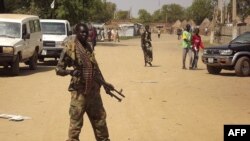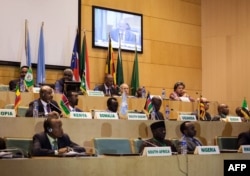The warring parties in South Sudan are facing renewed international pressure to honor a cease-fire and reach a peace deal, after failing to reach any kind of agreement at talks in Addis Ababa this week.
The East African bloc IGAD, which mediated the talks, has said it will consider "punitive measures" against violators of last year's cessation-of-hostilities accord. The African Union gave a similar warning ahead of the talks.
Neither the AU nor IGAD outlined what those measures may be. Envoys from the United States and Britain said more countries need to impose sanctions on individuals and groups seen to be blocking the peace process.
"We have taken an approach using sanctions where we want to apply pressure and also to hold people accountable," said Brian Shukan, director of the office of the U.S. Special Envoy for South Sudan. "That is something we think needs to be echoed as much as possible by countries in the region and in the international community."
Christopher Trott, Britain's special envoy for Sudan and South Sudan, agrees.
"We are in the process of looking [for] ways in which we can introduce sanctions on individuals, both for corrupt practices and for obstructing the peace process," he told VOA's South Sudan in Focus.
Brian Adeba is the deputy director of policy for the Enough Project, which researches alleged war crimes and crimes against humanity in several African countries.
He says corruption is at the heart the war between President Salva Kiir's government and opposition groups.
"What is at the root cause of this conflict is an incentive structure, a financial incentive structure that allows this intransigence to perpetuate itself and we need to tackle that incentive structure. Unless we do that, I don't think we are going to see peace in South Sudan at the moment," he told VOA.
South Sudan's resources have dwindled since the start of the war in December 2013 but the government still earns money from oil sales and fees for various services, such as passports.
"The system itself is so corrupt, corruption is not an aberration, it is the system," Adeba said.
The war, now in its fifth year, has driven more than four million South Sudanese from their homes and caused a humanitarian crisis that has left some seven million people in need of aid.
Last year, the U.S. imposed travel and financial sanctions on two top South Sudanese government officials and a former army chief. The European Union imposed sanctions on the same three men in February.
In March, the U.S. imposed economic sanctions on 15 South Sudanese oil companies that it said were key sources of cash for the government.
VOA's Nike Ching and Salem Solomon contributed to this report.







